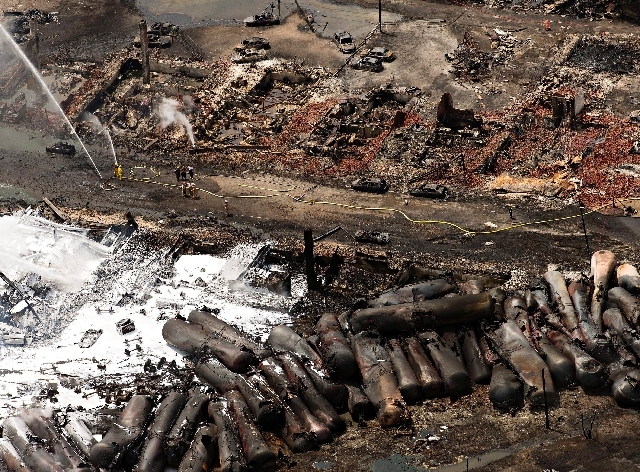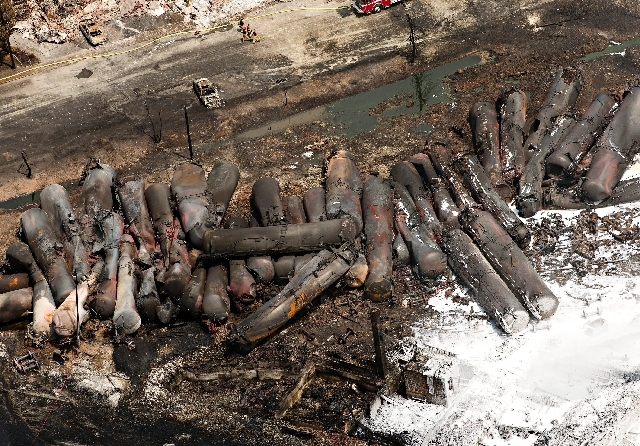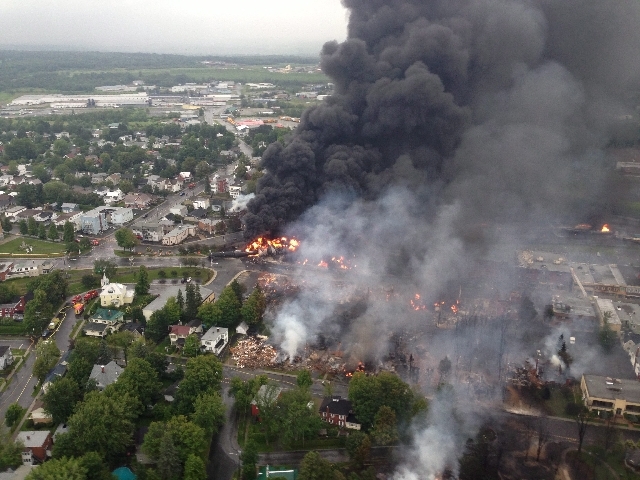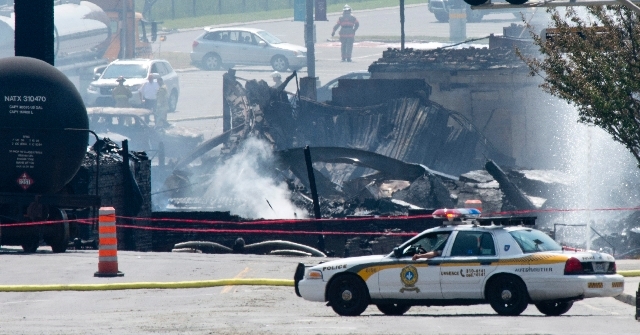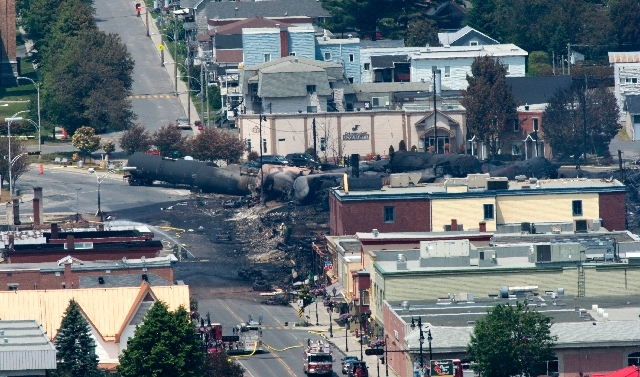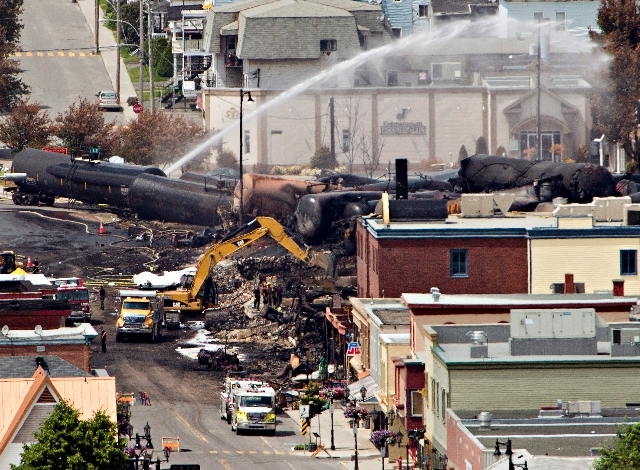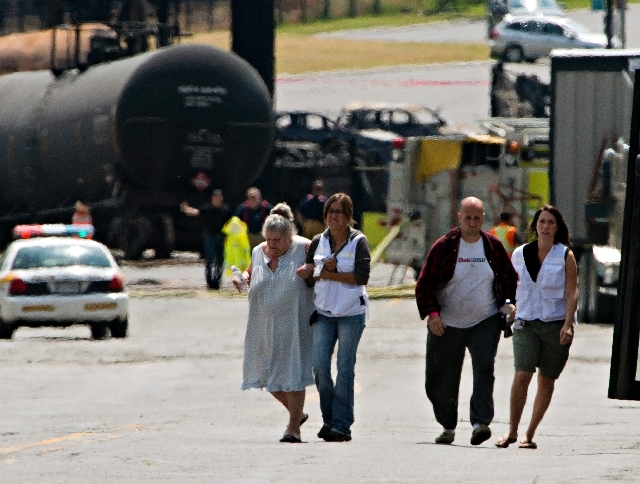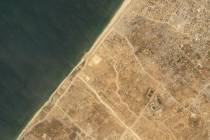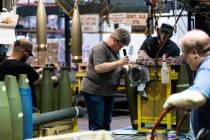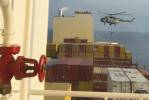40 still missing in deadly Canada oil train crash
LAC-MEGANTIC, Quebec — Hazardous conditions slowed firefighters’ attempts Monday afternoon to search for some 40 people still missing after a runaway oil tanker train exploded over the weekend in a Quebec town, killing at least five people and incinerating at least 30 buildings, officials said.
Richard Gagne, a spokesman for Quebec provincial police, said it was still too risky to begin searching for the missing while firefighters made sure all flames were out and the unexploded oil tankers were kept cool.
The crash raised questions about the safety of Canada’s growing transportation of oil by train.
All but one of the train’s 73 tanker cars were carrying oil when they somehow came loose early Saturday, sped downhill nearly seven miles (11 kilometers) into the town of Lac-Megantic, near the Maine border, and derailed, with at least five of the cars exploding.
The train’s owners said they believed brake failure was to blame. “Somehow those brakes were released, and that’s what is going to be investigated,” Joe McGonigle, Montreal, Maine & Atlantic’s vice president of marketing, said Sunday.
Meanwhile, crews were working to contain 100,000 litres (27,000 gallons) of light crude that spilled from the tankers and made its way into nearby waterways. There were fears it could flow into the St. Lawrence River all the way to Quebec City.
Quebec’s Environment Ministry Spokesman Eric Cardinal said officials remained hopeful they could contain more than 85 per cent of the spill.
The heart of the town of about 6,000 was leveled — including a popular bar where several dozen revelers were believed to have been at the time of the explosions. About a third of the community was forced out of their homes.
Sophie L’Heureux, a manager at the bar, was woken up at home by the explosion. She said she believed there were about 50 people in the bar, including many close friends.
“I’m in survival mode right now. My priority is to try sleep if I can, eat if I can,” she said. “For the rest, it’s one minute, one day at a time.”
Raymond Lafontaine, who lost four members of his family, including his son, said he was angry with what appeared to be lack of safety regulations.
“We always wait until there’s a big accident to change things,” he said. “Well, today we’ve have a big accident, it’s one of the biggest ever in Canada.”
Lafontaine said the government needs to take a hard look at the risks of transporting oil by train — especially through communities.
“It’s not hard to understand,” he said. “It’s dangerous. It’s like an atomic bomb.”
Canadian Prime Minister Stephen Harper toured the town Sunday and compared it to a war zone. Queen Elizabeth II expressed deep sadness over the disaster, saying in a message through the federal government that the loss of life “has shocked us all.”
The growing number of trains transporting crude oil in Canada and the United States had raised concerns of a major disaster, and this derailment was sure to bolster arguments that a proposed oil pipeline running from Canada across the U.S. — one that Canadian officials badly want — would be safer.
The train’s oil was being transported from North Dakota’s Bakken oil region to a refinery in New Brunswick. Because of limited pipeline capacity in the Bakken region and in Canada, oil producers are increasingly using railroads to transport oil to refineries.
The Canadian Railway Association recently estimated that as many as 140,000 carloads of crude oil will be shipped on Canada’s tracks this year — up from 500 carloads in 2009. The Quebec disaster is the fourth freight train accident in Canada under investigation involving crude oil shipments since the beginning of the year.
Harper has called railroad transit “far more environmentally challenging” while trying to persuade the Obama administration to approve the controversial Keystone XL oil pipeline from Canada to the Gulf Coast.
Wayde Schafer, a North Dakota spokesman for the Sierra Club, has predicted such a catastrophe ever since crude began leaving the North Dakota by rail in 2008.
“I think anybody could have foreseen this,” said Schafer. “It seemed like a disaster waiting to happen and it happened.”
___
Associated Press writer Rob Gillies and Charmaine Noronha contributed from Toronto. James MacPherson contributed from Bismarck, North Dakota.



